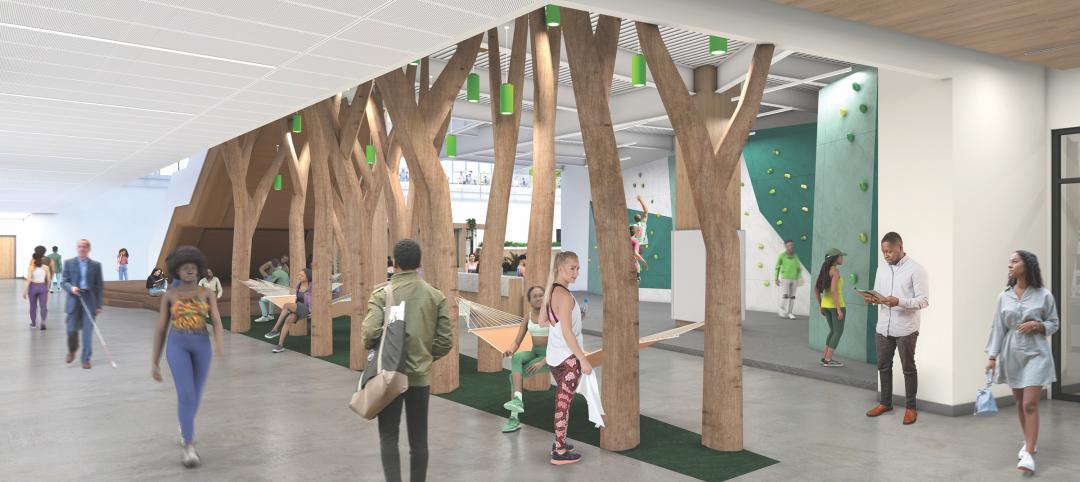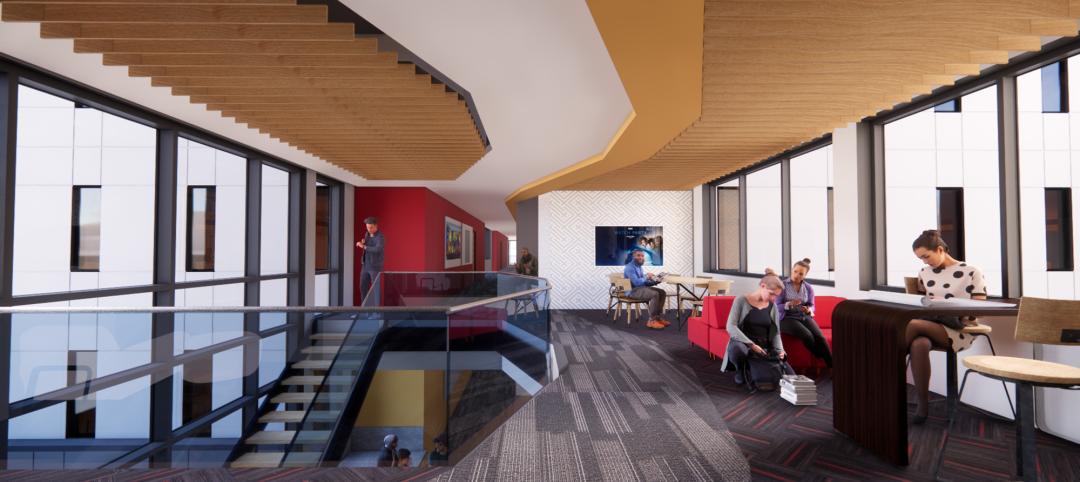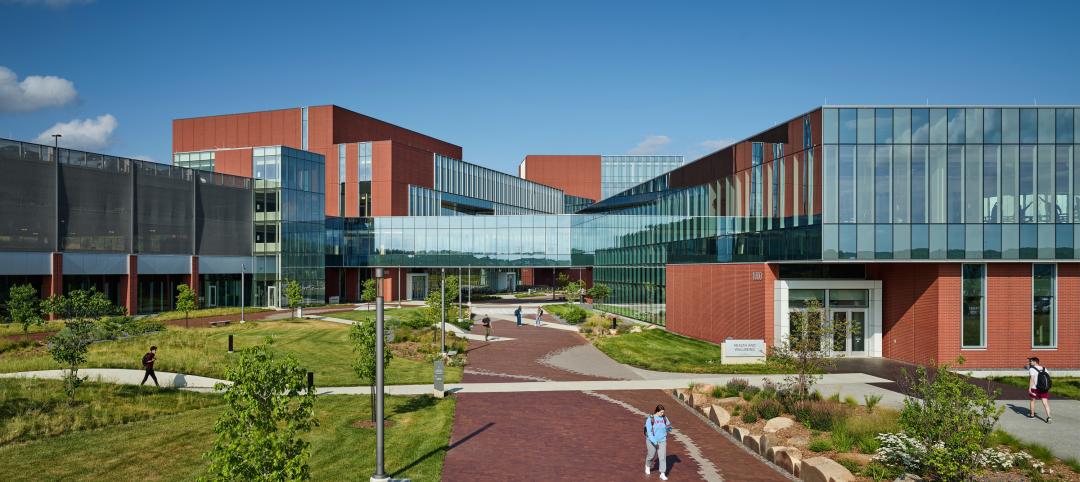The completion of the Zero Energy Research Laboratory at the University of North Texas will give students and researchers the tools to study the next generations of sustainable and renewable energy technologies.
The lab—the only one of its kind in Texas—is designed specifically to test various energy technologies and systems in order to achieve a net-zero consumption of energy.
Construction on UNT’s new facility began in July 2011. A ribbon cutting ceremony will be held at UNT’s Discovery Park on Friday, April 20 to celebrate the completion of the new facility.
The structure has a number of advanced energy technologies integrated into its 1,200-sf space, including a geothermal heat pump, a radiant heated floor slab, solar panels, a building energy monitoring and control system and a rainwater collection system, to name a few. Outside, the facility has a residential-scale wind turbine and an electric vehicle charging station.
The doors, windows, roof and supporting energy efficient equipment are designed to be easily expanded and exchanged so that researchers can analyze new building materials. Dr. Nandika D’Souza and her research team hope to use the facility to test their plant-based building materials eventually. D’Souza is developing materials made from the fibers of the kenaf plant, a cousin to bamboo, with a $600,000 grant from the National Science Foundation.
D’Souza is a key member of the Renewable Bioproducts and the Renewable Energy and Conservation research clusters. Both interdisciplinary research groups will take advantage of this unique facility to conduct cutting edge sustainability and energy research.
Dr. Yong Tao, chair of the Department of Mechanical and Energy engineering at UNT and the PACCAR Professor of Engineering, spearheaded the design and creation of the lab. Previously, Tao oversaw a similar project at Florida International University, where he served as an associate dean of their College of Engineering and Computing.
Tao also served as the director of the Future House USA project, an initiative that brought together academics, builders, industry sponsors and lobbyists to create a 3,200 square-foot zero-net energy house. The house was built in Beijing and displayed during the 2008 Olympic Games.
This project is funded at $1,150,000 with a combination of HEAF (higher education assistance funds), operating funds and gifts-in-kind. It was made possible by donations from Schneider Electric, NuconSteel, Axium Solar, H2Options/BlueScope Water, Benchmark Precision Buildings and Acme Brick. Jacobs Engineering Group Inc. is the architect of record for the facility and Nouveau Construction served as the general contractor. BD+C
Related Stories
Construction Costs | Oct 16, 2024
Construction Crane Index: Most major markets’ crane counts increase or hold steady in third quarter
Rider Levett Bucknall’s (RLB’s) latest Crane Index and Quarterly Cost Report shows continued decreasing cost inflation and crane counts increasing or holding steady in 10 of the 14 major markets it surveyed. The national average increase in construction costs was 1.07%, the lowest it’s been in the last three years.
AEC Tech | Oct 16, 2024
How AI can augment the design visualization process
Blog author Tim Beecken, AIA, uses the design of an airport as a case-study for AI’s potential in design visualizations.
University Buildings | Oct 15, 2024
Recreation and wellness are bedfellows in new campus student centers
Student demands for amenities and services that address their emotional and mental wellbeing are impacting new development on college campuses that has led to recreation centers with wellness portfolios.
Higher Education | Oct 14, 2024
Higher education design for the first-gen college student
In this Design Collaborative blog, Yogen Solanki, Assoc. AIA, shares how architecture and design can help higher education institutions address some of the challenges faced by first-generation students.
Performing Arts Centers | Oct 10, 2024
Studio Gang's performing arts center for Hudson Valley Shakespeare breaks ground
A new permanent home for Hudson Valley Shakespeare, a professional non-profit theater company, recently broke ground in Garrison, N.Y. The Samuel H. Scripps Theater Center includes a 14,850 sf performance venue that will serve as a permanent home for the theater company known for its sweeping open-air productions of classics and new works.
Sustainable Design and Construction | Oct 10, 2024
Northglenn, a Denver suburb, opens a net zero, all-electric city hall with a mass timber structure
Northglenn, Colo., a Denver suburb, has opened the new Northglenn City Hall—a net zero, fully electric building with a mass timber structure. The 32,600-sf, $33.7 million building houses 60 city staffers. Designed by Anderson Mason Dale Architects, Northglenn City Hall is set to become the first municipal building in Colorado, and one of the first in the country, to achieve the Core certification: a green building rating system overseen by the International Living Future Institute.
3D Printing | Oct 9, 2024
3D-printed construction milestones take shape in Tennessee and Texas
Two notable 3D-printed projects mark milestones in the new construction technique of “printing” structures with specialized concrete. In Athens, Tennessee, Walmart hired Alquist 3D to build a 20-foot-high store expansion, one of the largest freestanding 3D-printed commercial concrete structures in the U.S. In Marfa, Texas, the world’s first 3D-printed hotel is under construction at an existing hotel and campground site.
University Buildings | Oct 9, 2024
Des Moines University Medicine and Health Sciences opens a new 88-acre campus
Des Moines University Medicine and Health Sciences has opened a new campus spanning 88 acres, over three times larger than its previous location. Designed by RDG Planning & Design and built by Turner Construction, the $260 million campus features technology-rich, flexible educational spaces that promote innovative teaching methods, expand research activity, and enhance clinical services. The campus includes four buildings connected with elevated pathways and totaling 382,000 sf.
Student Housing | Oct 9, 2024
University of Maryland begins work on $148 million graduate student housing development
The University of Maryland, in partnership with Campus Apartments and Mosaic Development Partners, has broken ground on a $148.75 million graduate student housing project on the university’s flagship College Park campus. The project will add 741 beds in 465 fully furnished apartments.
Healthcare Facilities | Oct 9, 2024
How healthcare operations inform design
Amanda Fisher, Communications Specialist, shares how BWBR's personalized approach and specialized experience can make a meaningful impact to healthcare facilities.
















